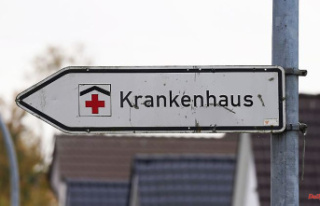Anyone who travels a lot by car for work has had to pay more for refueling for months. This is particularly noticeable in outpatient care services in rural areas. What is the way out?
Magdeburg (dpa/sa) - Due to the persistently high fuel costs, outpatient care services in Saxony-Anhalt are urging financial support. "We are currently paying for every trip in outpatient care," says Anke Brumm, Managing Director of Malteser in the Diocese of Magdeburg. The Federal Association of Private Providers of Social Services (BPA) is calling for a change in the law in order to oblige the long-term care insurance funds to re-arrange energy costs. However, the situation for the nursing services could possibly not change until next year.
According to the Awo-Kreisverband Burgenlandkreis, the cost increases for fuel are around 30 percent. "The jump in prices coincides with the outbreak of the war in Ukraine," says managing director Torsten Fulczynski. So far, there has been no compensation from the long-term care insurance funds for refinancing. On land tours, 60 kilometers would quickly accumulate, in individual cases even more. "Our service is generally more in rural areas than in urban areas."
This is currently the case for many companies in the care sector. "The facilities are already reporting that the total energy costs have tripled," says DRK state manager Carlhans Uhle. He sees the federal government as responsible for providing short-term help.
Anke Brumm from the Malteser also speaks of a "massive additional economic burden". So far, no energy cost aid has been received from the federal or state governments. The health and long-term care insurance funds have also not yet complied with a recommendation from the Federal Ministry of Health to negotiate the rising fuel prices in an extra round.
The BPA in Saxony-Anhalt is critical. Especially in rural areas, an individual journey to a patient is increasingly no longer covered by the flat-rate payment, says specialist Fabian Herrmann. Demands for renegotiations were rejected by the cash registers. "We need a change in the law to force the long-term care insurance funds to re-agree on energy costs."
Klaus Holst, head of the state representation of the substitute funds in Saxony-Anhalt, says that renegotiations for the current year are possible in principle. However, cost increases would then have to be proven in great detail by the nursing services. "We have rules under which remuneration agreements are conducted." Holst prefers to focus on the next regular negotiations from January 1, 2023. The fuel costs would also be taken into account, according to Holst.
According to the Awo, the rising fuel costs are not only problematic for outpatient care services, but also for day care facilities. For years there has only been a flat fee of two euros per trip, which is not sufficient. Not only fuel costs, but also the drivers and all other vehicle costs would have to be paid from this. "It would definitely have to be improved there. However, the cash registers have been vehemently blocking it for years," says Fulczynski.












